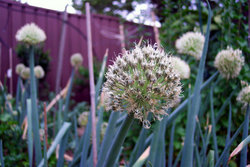| Shallot | ||||||||||||||
|---|---|---|---|---|---|---|---|---|---|---|---|---|---|---|
| Scientific classification | ||||||||||||||
| ||||||||||||||
| Binomial name | ||||||||||||||
| Allium oschaninii O. Fedtsch |
Shallot as the word is commonly used, refers to two different Allium species. The French grey shallot or griselle, which has been considered to be the "true shallot" by many, is Allium oschaninii, a species which grows wild from central to southwest Asia. Other varieties of shallot are Allium cepa var. aggregatum (multiplier onions). [1]
Shallots are extensively cultivated and much used in cookery, in addition to being excellent when pickled. Their flavor is more delicate than that of onions. Finely sliced deep-fried shallots are used as a condiment in Asian cuisine. Shallots tend to be considerably more expensive than onions, especially in the United States where they are almost exclusively imported from France.
Shallots are propagated by offsets, which are often planted in September or October, but the principal crop should not be harvested earlier than February or the beginning of March. In planting, the tops of the bulbs should be kept a little above ground, and it is a commendable plan to draw away the soil surrounding the bulbs when their roots have taken hold. They should not be planted on ground recently manured. They come to maturity about July or August, although they can now be found year-round in supermarkets.
Like onions, when sliced raw shallots release chemicals that irritate the eye, resulting in tears. See onion for a discussion of this phenomenon.

